|
 |
|
|
Vol. 8 No. 26 WE COVER THE WORLD Tuesday March 3, 2009 |
Official
On-Site Publication World Cargo Symposium Bangkok 2009 Day
2 |

For an event that has been - by
any measure - successful in its first two years, it is heartening that organizers
have welcomed feedback and actually responded to it.
Of course, it is also encouraging when the main
criticism has been that the event offered too much substance.
The number of concurrent tracks offered at this
year’s WCS was reduced in response to past complaints that IATA’s
packed agenda compelled registrants to choose between multiple sessions of
interest.
Tracks cut this year may return in alternating
years – potentially good news for attendees at the previous airports
track.
Speaking of airports, in an era of competition
between events and rivalries between trade associations, Airports Council
International – North America actually moved their own cargo event in
Memphis back one week to March 10-12, specifically to avoid overlapping IATA
WCS.
Such cooperation is welcome if all too uncommon
at times.
The 2009 IATA World Cargo Symposium theme of
“Focus on the customer – delivering in turbulent times”
applies to virtually every aspect of the industry but particularly to cargo
security – one of eight concurrent ‘tracks’ to run on March
4th.
Given that the competitive advantage of air
transport is speed and reliability for which shippers must pay a premium,
anything that diminishes those two qualities goes to the core of the business.
It is impossible to have an informed dialogue about cargo security that ignores
the need to preserve the purposes for which industry has traditionally relied
upon air.
Neither IATA nor its constituents benefit from
merely dodging responsibilities or avoiding security costs for its own sake.
Rather, IATA seeks to ensure that requirements
effectively deliver what is intended and that expenditures are proportionate
and integral to the objectives. In such an economic environment, little tolerance
(financial and otherwise) exists for expensive window-dressing creating the
illusion of a tighter security environment.
Nor
is there much enthusiasm – beyond a few consultants and technology providers
– for a ‘jobs bill’ disguised as a security program.
According to John Edwards, Head of Cargo Security
for IATA, the industry needs:
•
Required measures to be proportionate, i.e. threat-based and risk-managed
•
A multi-layered coherent, simplified regulatory environment
•
Solid relationships with regulators and other key stakeholders
•
Relevant innovation and technology developments to be recognized
•
All requirements to be efficient, cost-effective and sustainable
Recognizing its own limits to influence national
interests, IATA nonetheless seeks to at least inform them - promoting acceptance
of global standards whenever practicable and effective.
Such standardization might well yield cost-savings,
but also bridges gaps created by variances in global supply chain security
programs.
As much as possible, IATA seeks to avoid needlessly
‘reinventing the wheel’, preferring to champion programs already
demonstrably effective and to raise the profile of such resources to the broader
audience IATA garners.
Such lofty objectives require not only the right
mix of presenters but an audience bringing their own experiences and given
the opportunity to participate in the dialogue.
An informed dialogue is precisely what IATA
strives for in its event – not a series of monologues.
While assuring its presenters are prepared and
encouraging the sharing of research, WCS organizers limit speeches in favor
of content attendees will not have received in other venues.
Uniquely, each WCS track winds up with establishment
of take-away action items reported in the larger forum. Providing a work- plan,
these objectives provide continuity between scheduled events – consistent
with IATA’s role as an action-oriented organization rather than schedule-planner.
plan,
these objectives provide continuity between scheduled events – consistent
with IATA’s role as an action-oriented organization rather than schedule-planner.
Anchoring the security track will be IATA’s
Head of Cargo Security John Edwards and moderating the panel discussions will
be U.S. cargo consultant, Michael Webber of Kansas City-based Webber Air Cargo.
Among presenters is Marcus Hallside, President
of Innovative Compliance Europe Ltd. Years before 9/11, Hallside was active
in the development of cargo security solutions.
Resulting from a 1999 proposal to the U.S. FAA
for an aviation regulatory research program to address risk in air cargo shipments,
Hallside directed research resulting in a prototype Known Shipper database.
Such tools are critical to development of layered
programs more based in scientific method than ‘feel good public policy’.
A host of regulators from North America, Europe
and Asia will also serve on panels, including several who have participated
in earlier WCS events. While regulators may explore programs under their own
jurisdictions, the collective can also count on being asked to provide examples
of responsibilities the industrialized nations have for assisting the developing
regions in meeting global standards.
Geoffrey
WCS Up Close & PersonalBangkok Exclusive—People from all over the world are either
in Bangkok or focused on IATA World Cargo Symposium (WCS) this week. |
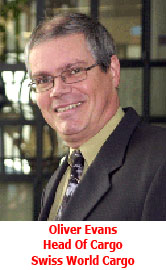 We need to discuss flexible solutions and elaborate different scenarios for the next three or even more months. Looking beyond our own business we are witnessing the shutting down of factories, people losing their jobs. Considering this situation I believe the markets are going to get even worse in the |
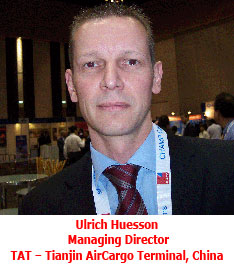 A second reason why China’s northern industries are hit less by the global downturn is because there is a broader mix of commodities, like the production of machinery parts, pharmaceuticals, consumer goods or components for the aviation sector. Take Tianjin, located about 1,5h drive east of Beijing. This place is developing into a formidable logistics and cargo hub, with as many as 4,000 Chinese and about 10,000 foreign enterprises being located already in the new industrial Bin Hai area that today already is four times as big as Shanghai’s Pudong production zone. Now, Beijing’s government decided to support the logistics and transport sector at Tianjin even further by offering enterprises a package of up to 5 billion U.S. dollars for settling and doing business there. Hence, the site offers ample business opportunities for shippers, cargo airlines, and agents. That’s a major aspect that I like to point out in discussions and meetings here at the WCS.” |
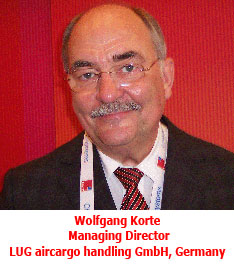 Profit enhancements are extremely difficult to achieve under the given circumstances. |
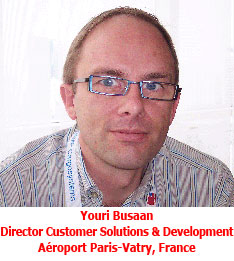 Therefore, I opt for a different view IATA should take by not leaving it up to the different participants to perform as they like, but rather insist on compliance of certain quality standards I believe this could be a major step to get our industry ahead. |
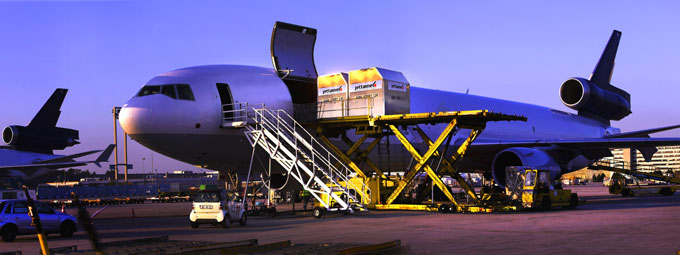
They are named LD 7, LD 3, AAN, AAY, AMF or
AKH – transport boxes for different aircraft, purposes and fits.
Not much attention was paid to these and alike
unit load devices for quite some years.
Many considered them a necessary evil that had
to be there when needed by ground handlers or carriers at their warehouses
for packing and flying out goods.
That was it.
Meanwhile, times have changed dramatically.
The days of “a ULD, is a ULD, is a ULD”
are gone.
Main credit for bringing ULDs under closer scrutiny
deserves the perishables biz as front-runner in the demand for specialized
containers enabling temperature sensitive transports of flowers, vegetables,
meat and similar produce.
With their role constantly growing IATA’s
last World Cargo Symposium 2008 at Rome honored this topic by putting aluminum
boxes and pallet equipment on the agenda.
By taking the ULDs out of the shadow and placing
them right in the spotlight a process was initiated that raised basic questions
like inventory costs, appropriate ULD management systems, adequate handling
and storage equipment, higher asset utilization and last but not least the
pros and cons of outsourcing the pallet and container business since managing
ULDs does not belong to the core activities of airlines.
Now, a year after the Rome debates, this topic
is even more pressing due to the global economic downturn that continues to
impact air cargo.
Consequently, the ULD topic is increasingly
seen by controllers and airline managers as a means to reduce unnecessary
costs.
Given this, the pros and cons of outsourcing will be a major issue that WCS
placed on the agenda.
A second important aspect is the operational
environment of ULDs outside of the aircraft.
They probably spend more time in warehouses
respectively on aprons than they actually do in flying aircraft, criticizes
IATA.
Which technical improvements are possible to
reduce the weight of the ULDs and how can the ground handling of the equipment
be improved for the benefit of the air freight industry are further questions
standing on Bangkok’s IATA Cargo agenda. Followed by what can be done
to reduce the damaging of containers and pallets and thus minimize costs.
A new generation of light but durable containers
that are presently tested will be illustrated during the event together with
case studies on how the ULDs blend into the logistics chain.
Finally, a panel including airline managers,
ULD manufacturers and operators is given room to wrap up the many presentations
and contributions and present the floor their own thoughts on how the equipment
for transporting goods in belly-hold compartments of passenger aircraft or
main decks of freighters should be designed, professionally managed and efficiently
utilized.
Heiner Siegmund
Smart Thinking & Good Advice
|
|

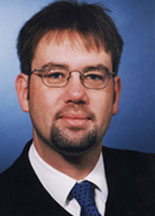 No,
the message he delivers at WCS Bangkok meeting might not be filed as an
extraordinary revolutionary or visionary approach in the annals of IATA’s
WCS.
No,
the message he delivers at WCS Bangkok meeting might not be filed as an
extraordinary revolutionary or visionary approach in the annals of IATA’s
WCS.
Nevertheless, it’s
the important daily biz that Nokia’s Juergen Bellwinkel intends to
improve by directing the spotlight on a number of very practical and forward
driving issues the cargo industry has so far circumvented.
One of the key items
on his agenda is the ULD usage.
“We could
optimize the packing processes if we’d know exactly the kind of aircraft
the carrier intends to fly our shipments with,” says Nokia’s
Global Director Outbound Logistics and Transports.
If this data were
being provided early enough to the cell phone manufacturer, “our warehousing
people would know precisely which sorts of pallets fit best for a certain
aircraft variant.”
Due to the lack
of ULD information, there still is a lot of air being transported instead
of cell phones or their components presently, Bellwinkel argues.
Everybody would
benefit if aircraft utilization could be optimized - shippers, forwarders,
and carriers.
“It would
be a small leap but a major improvement by adding value for all participants,”
he says.
Unfortunately, the
cargo industry is still too fragmented with each player within the supply
chain stuck to his own traditional duties more or less.
The different actor’s
thinking often ends at their fence and hardly reaches much beyond.
“What is necessary
are new collaborative efforts that combine the expertise of airlines, agents
and shippers rather than conserving the outdated lone player attitude many
still prefer by just concentrating on their own daily routine. “Carriers
could send us their loadmasters to tell our warehouse people what the specific
packaging and ULD requirements of a cargo airline are,” Bellwinkel
says.
Thus, by looking
beyond their own fence and by combing forces a rather complex process would
become more transparent right at the place where shipments originate.
This will result
in delivering better quality at fewer costs for everybody involved.
To add, that the
planet would benefit from supply chain improvements, too, by reduced greenhouse
gas emissions and more sustainability.
“This specific
environmental aspect, that is becoming increasingly important for our industry,
is a cornerstone in Nokia’s corporate culture,” the manager
emphasizes.
IATA’s Bangkok
Symposium, Bellwinkel recommends, is the place where the idea of more collaborative
planning processes and thus animate the supply chain actors to better combine
their particular strengths can take wing. “If IATA doesn’t take
the initiative who will then?” he asks.
The manager’s
proposed interdependent approach could also lead to more cost transparency,
a very much neglected topic so far.
“Take the
fuel surcharges last year.
They went up and
up but the index for price increases remained quite a hidden secret,”
Bellwinkel recaps.
According to him
at minimum structure transparency is necessary to illustrate to shippers
why surcharges have been changed.
“Our problem
is twofold.
“The airlines
never give us basic data about their surcharge regime and secondly as vendors
we were completely unable to pass these additional costs on to our clientele.”
Bangkok WCS he hopes,
should elaborate on practical solutions for higher transparency in pricing
and shipping matters and more cost efficiency, too.
Heiner Siegmund
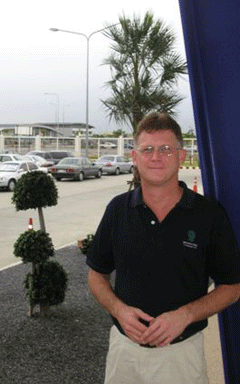 In
Thailand Bangkok Flight Services (BFS) is the go-to air cargo operation
at Suvarnabhumi Airport.
In
Thailand Bangkok Flight Services (BFS) is the go-to air cargo operation
at Suvarnabhumi Airport.
Stewart Sinclair, Managing Director Bangkok
Flight Services and VP Asia for WFS told Air Cargo News/Flying Typers
that “the effects of the global financial meltdown have impacted here,”
(just like everywhere else) “with cargo volumes down over 11% over
each of the last 3 months and passenger numbers dipping close to 10% - unheralded
since the aftermath of 9/11”.
“The knock-on effect of the super-high
fuel prices in the mid part of last year are still with us as many airlines
hedged their fuel at prices over 100 USD per barrel and are unable to take
full advantage of the drop in fuel prices seen since.
“All of this was compounded in Bangkok
by the closure of the city’s airports for 10 days in late November
and early December, delivering a sharp blow to the beginning of the high
season for tourist arrivals.
“Truly a “perfect storm”
of blows to our industry, which has left us all facing its severe impact
on our businesses.
“It is at times like this that the strongest
survive and this is when superior service becomes critical.
“But the challenge is always how to
reduce costs but at the same time maintain quality that differentiates you
from your competitor.
“This is equally true for BFS –
our position is to strive to continue to provide the highest levels of service
to our customers but also to reduce costs allowing us to prevail.
“BFS has had to react quickly to cut
non-essentials, even canceling our annual customer golf event, very sad
to all of us that miss that day of networking and fun.
“But these are tough times so we have
identified a number of similar cost savings as part of a much leaner year
for BFS.
“However we will not compromise safety
or training and have not cut resources from these areas or from maintenance
of our equipment.
“We are also attempting to share the
pain of less compensation all around as an alternative to not making some
people redundant.”
We like Stewart Sinclair, in fact have liked
him since he opened the station in 2006 and would not allow some tough press
coverage about systems glitches phase him a bit, even when some local Thai
stories got his name wrong identifying him as Sinclair Stewart.
“Call me anything, but not late for
dinner,” the youthful executive laughs.
A fan of spicy Thai chicken salad and unwinding
at the beach, Sinclair takes the heat these days, having arrived at WFS
in 1992 from a school that eschews the limelight in favor of behind the
scene competence.
“In addition to other responsibilities
including opportunities for new business in markets, getting our service
delivery right will continue in good times or otherwise as top priority,”
he says.
“So it’s all hands against that
objective.”
Geoffrey
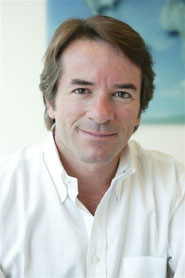
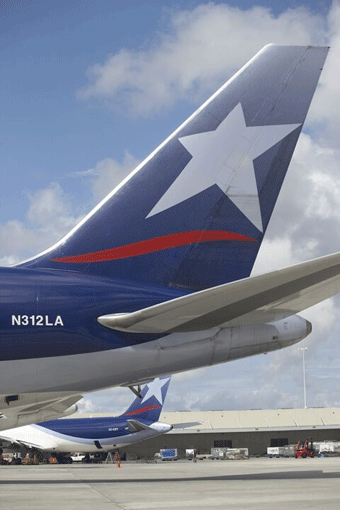 The
track is called Revenue Optimization and the characters are familiar industry
professionals like Decartes’ Vince Ryan and IATA’s Nick Blake
in an open from the floor Q&A at BKK WCS the morning of March 4.
The
track is called Revenue Optimization and the characters are familiar industry
professionals like Decartes’ Vince Ryan and IATA’s Nick Blake
in an open from the floor Q&A at BKK WCS the morning of March 4.
But attention is also drawn to Cristián
Ureta Larraín, the youthful and dynamic CEO of LAN Cargo who in
the spirit of bettering air cargo for everyone is offering himself up
deep dish with a presentation titled “Turning Revenue into Profits
- Keys to Success.”
Not only will Mr. Ureta be making an all
too rare public address, but the session
will also provide an opportunity for the audience to hear from a much
admired cargo operator’s experience of dealing with the issue of
turning revenue into profits.
Interestingly Senõr Uretas’
address will precede a networking luncheon that in any case will certainly
have plenty of food for thought even before the first celery stalks the
banquet hall.
Geoffrey
|
|
Thanks to Emirates Airline for providing us transportation to IATA World Cargo Symposium 2009 |
Publisher-Geoffrey Arend • Managing Editor-Flossie
Arend • Advertising Sales-Judy Miller
Send comments and news to geoffrey@aircargonews.com
Air Cargo News FlyingTypers reserves the right to edit all submissions
for length and content.
All Cargo Media, Publishers of Air Cargo News Digital and FlyingTypers
Copyright ©2009 ACM, Inc. All Rights Reserved.
More@ www.aircargonews.com